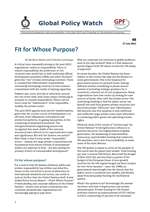Published on Thu, 2015-08-13 15:21
The UN has published the final outcome document for the 2030 Agenda for Sustainable Development to be officially adopted at a UN Summit on September 25-27, 2015 in New York. The Agenda sets out the aims of the organization and all its members for the coming 15 years in the fields of social development, curbing equalities, economic progress and environmental sustainability. If taken seriously, the 2030 Agenda will require profound changes in policies as well as governance and has the potential to shape debates in each and every country around the world for years to come. |
Published on Wed, 2015-08-12 00:00
A United Nations committee has adopted a set of nine principles for sovereign debt restructuring after two years of deliberations. A report will now be submitted to the UN General Assembly for its review and action. The adoption of the Principles on Sovereign Debt Restructuring Processes is timely, as more countries are facing or are in danger of facing sovereign debt crises, and the need for and terms of restructuring their debts have become urgent and often controversial topics. The nine principles were agreed to at the third working session of the Ad Hoc Committee on Sovereign Debt Restructuring Processes on 27-28 July held at the UN headquarters in New York. They will be part of the Chair's summary to be submitted to the UN General Assembly. |
Published on Fri, 2015-08-07 15:02
After over eight months of intergovernmental negotiations in New York and numerous iterations of an outcome document, consensus was reached on the United Nations’ post-2015 development agenda, titled “Transforming Our World: The 2030 Agenda”, on the evening of Sunday 2 August. The talks were scheduled for 20 to 31 July and with continuing differences over several key issues, almost non-stop closed-door negotiations stretched into the weekend. The finalized text will be adopted formally at a Summit on 25-27 September during this year’s UN General Assembly session. The post-2015 agenda’s outcome document consists, at its center, the Sustainable Development Goals (which are built on 17 goals and 169 targets produced by the UN Open Working Group in 2013-2014), as well as a political declaration, a chapter on means of implementation, and a chapter on conclusion on follow-up and review. Together, this agenda is to serve as a foundation for international development cooperation for a period of 15 years, coming into effect on September 2015 and expiring in September 2030. |
Published on Thu, 2015-08-06 00:00
As the financial goalposts for the Sustainable Development Goals (SDGs) to be agreed at the UN’s September summit, were established a few weeks ago at the Financing for Development conference, the elephant in the room remains the role of the private sector in education delivery. It seems that the World Bank and UN have increasingly different visions of how the education goal and children’s right to education should be met. |
Published on Fri, 2015-07-31 18:12
A critical issue repeatedly arising in the post-2015 negotiations relates to responsibility. There is shared responsibility, the preference of rich countries who would like to shift traditional official development assistance (ODA) and other “burdens” given the “rise” of some developing countries. There is common but differentiated responsibility, stressed by developing countries to link common commitment with the reality of varying capacities. Debates also circle, directly or otherwise, around the role of the state, with some camps continuing to promote its central responsibility. Others call for more room for “stakeholders” to be responsible—notably, the private sector. |
SUSCRIBE TO OUR NEWSLETTER







